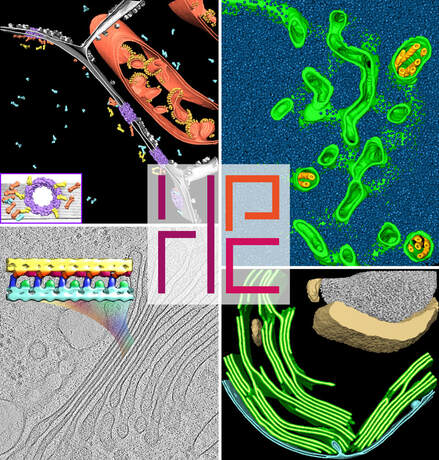
We are searching for an awesome postdoc to become the “computational heart” of our new group at the Helmholtz Pioneer Campus in Munich. This position has long-term prospects and is fully funded for at least the next FIVE YEARS. It can start as early as November 2019.
In our Cell Architecture Lab, we use in situ cryo-electron tomography to explore the native cellular environment at molecular resolution. We study the molecular architecture of eukaryotic organelles (including the cilium, Golgi, and chloroplast) in a wide variety of organisms, from human cells to ecologically important marine algae. We are particularly interested in understanding how the molecular architecture of the chloroplast is affected by environmental stresses caused by climate change. For more information, please check out our group’s brand-new website:
https://www.cellarchlab.com/
We are looking for someone with a background in computation and image analysis who is comfortable with Linux, Matlab, Python, etc. Experience with cryo-EM structure determination (single particle or subtomogram averaging) is a plus. This postdoc will take a leading role as the group’s computational expert. In addition to their own independent projects, they will help our more biologically focused group members push their analysis forward. This postdoc will also help build our new computer system and manage our software.
The Helmholtz recently invested heavily into a new artificial intelligence initiative (https://www.haicu.de/), headed by our next-door neighbor, the Institute of Computational Biology. Therefore, joining our group provides the unique opportunity to synergize with this rich computational community to develop deep learning tools for the analysis of cellular tomograms, with the ultimate goal of making “visual proteomics” a reality.
Although we are looking for a computational postdoc, there will be plenty of opportunities to "get your hands dirty" and learn focused ion beam milling and high-resolution cellular tomography, both in our new lab at the Helmholtz Pioneer Campus and through our continued collaboration with the Baumeister Department at the Max Planck Institute of Biochemistry.
For more details or to apply, please contact me at: engelben [at] biochem.mpg.de.
The application should include:
1) A short 1-2 paragraph introduction about your background and goals. What are your strengths, and what would you like to learn?
2) A full-length CV, including a list of publications and the contact information for two references.
We will continue to accept applications until this position is filled. Come join us in Munich, the best place to live in the world!
In our Cell Architecture Lab, we use in situ cryo-electron tomography to explore the native cellular environment at molecular resolution. We study the molecular architecture of eukaryotic organelles (including the cilium, Golgi, and chloroplast) in a wide variety of organisms, from human cells to ecologically important marine algae. We are particularly interested in understanding how the molecular architecture of the chloroplast is affected by environmental stresses caused by climate change. For more information, please check out our group’s brand-new website:
https://www.cellarchlab.com/
We are looking for someone with a background in computation and image analysis who is comfortable with Linux, Matlab, Python, etc. Experience with cryo-EM structure determination (single particle or subtomogram averaging) is a plus. This postdoc will take a leading role as the group’s computational expert. In addition to their own independent projects, they will help our more biologically focused group members push their analysis forward. This postdoc will also help build our new computer system and manage our software.
The Helmholtz recently invested heavily into a new artificial intelligence initiative (https://www.haicu.de/), headed by our next-door neighbor, the Institute of Computational Biology. Therefore, joining our group provides the unique opportunity to synergize with this rich computational community to develop deep learning tools for the analysis of cellular tomograms, with the ultimate goal of making “visual proteomics” a reality.
Although we are looking for a computational postdoc, there will be plenty of opportunities to "get your hands dirty" and learn focused ion beam milling and high-resolution cellular tomography, both in our new lab at the Helmholtz Pioneer Campus and through our continued collaboration with the Baumeister Department at the Max Planck Institute of Biochemistry.
For more details or to apply, please contact me at: engelben [at] biochem.mpg.de.
The application should include:
1) A short 1-2 paragraph introduction about your background and goals. What are your strengths, and what would you like to learn?
2) A full-length CV, including a list of publications and the contact information for two references.
We will continue to accept applications until this position is filled. Come join us in Munich, the best place to live in the world!





